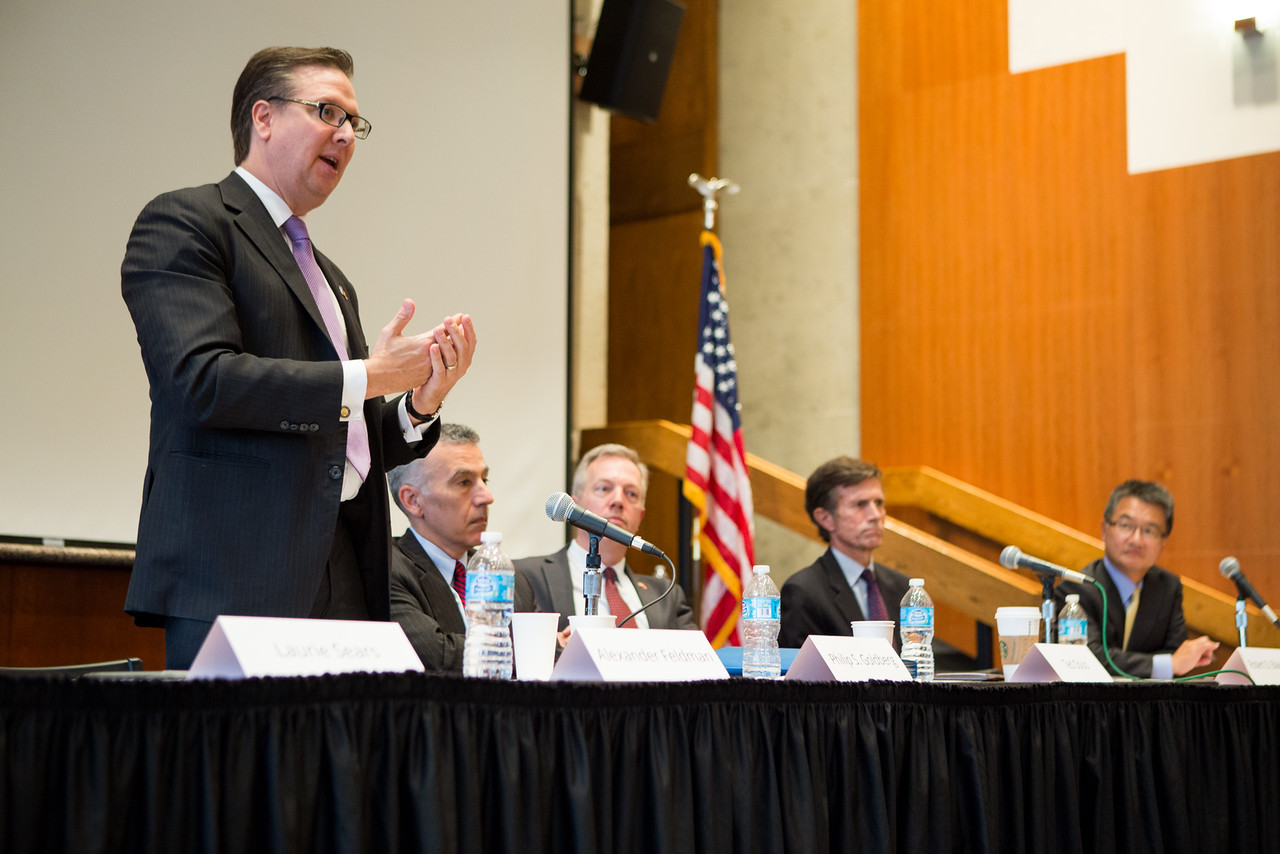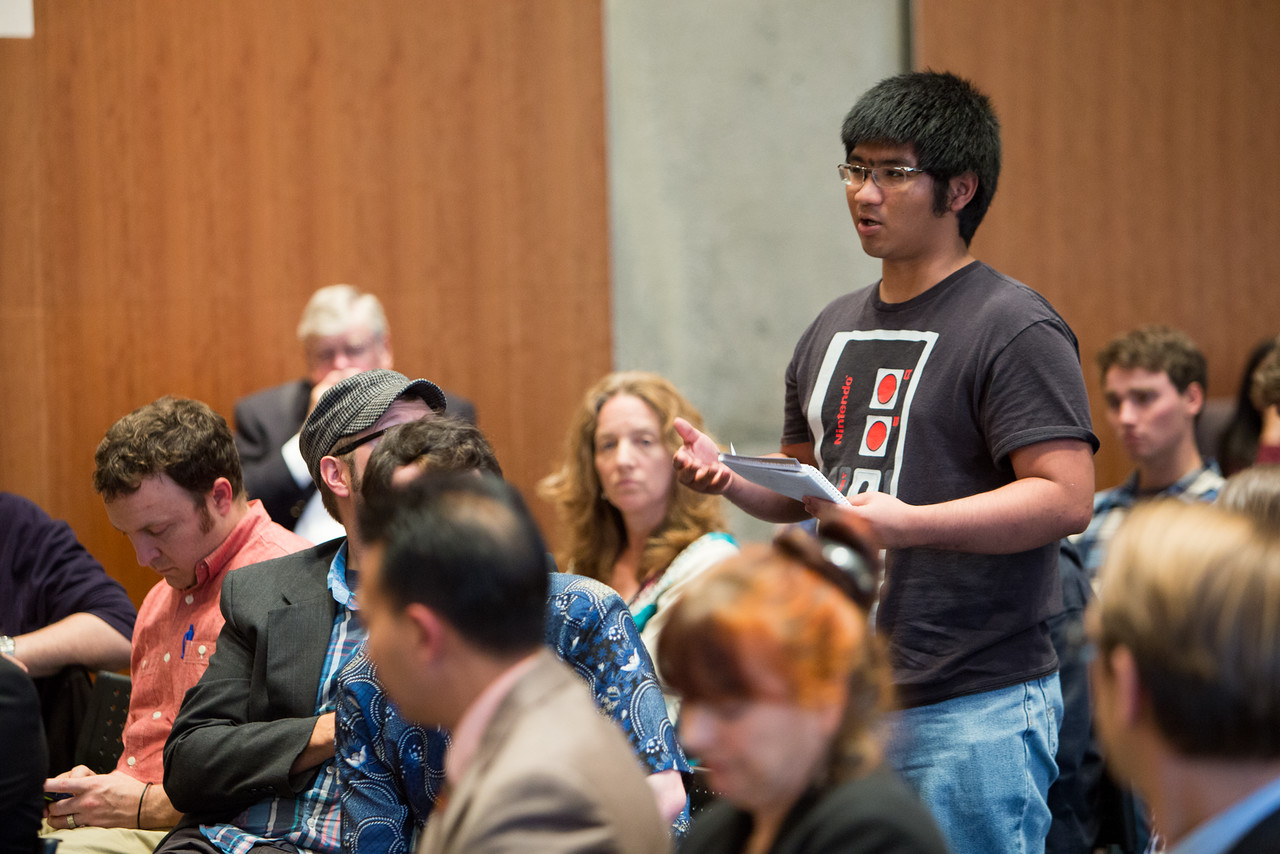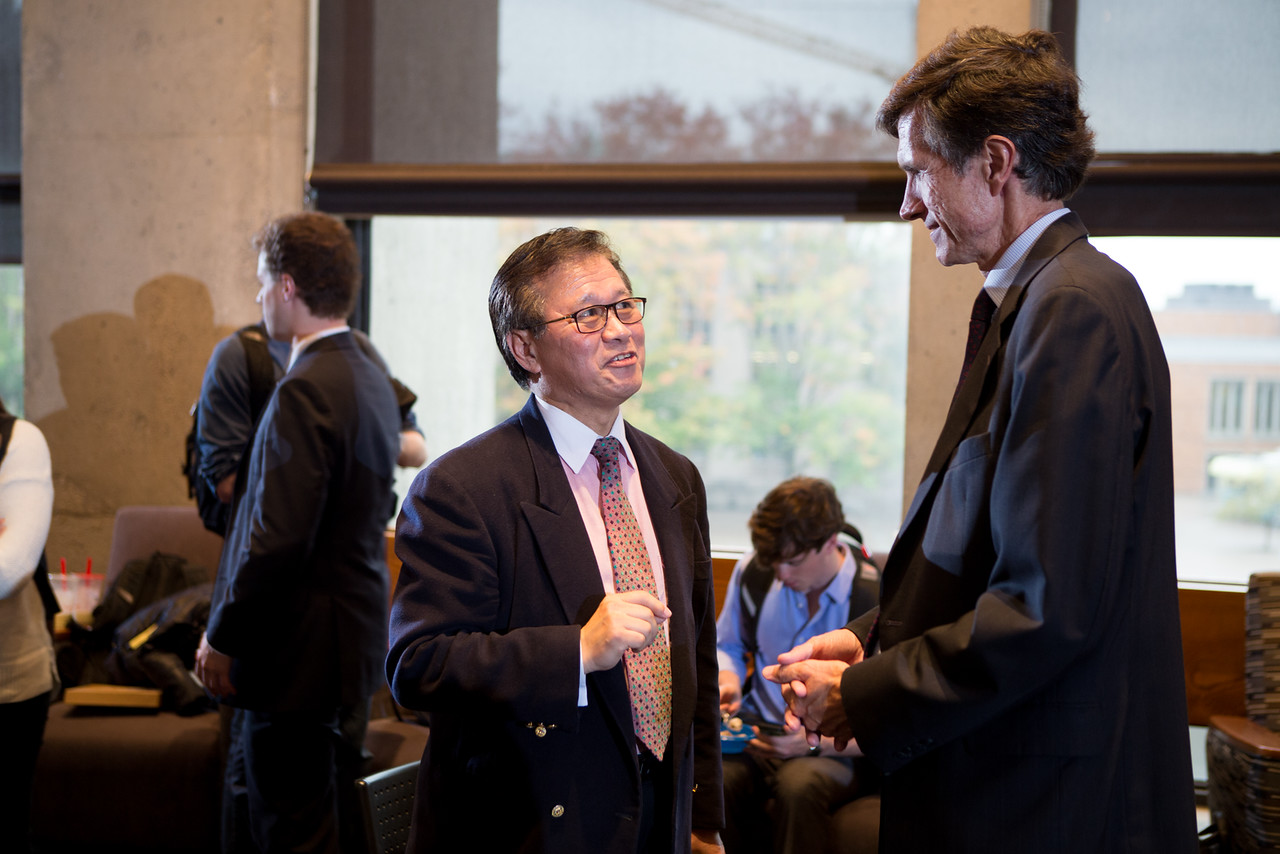Where the opportunities are: Diplomacy in Southeast Asia
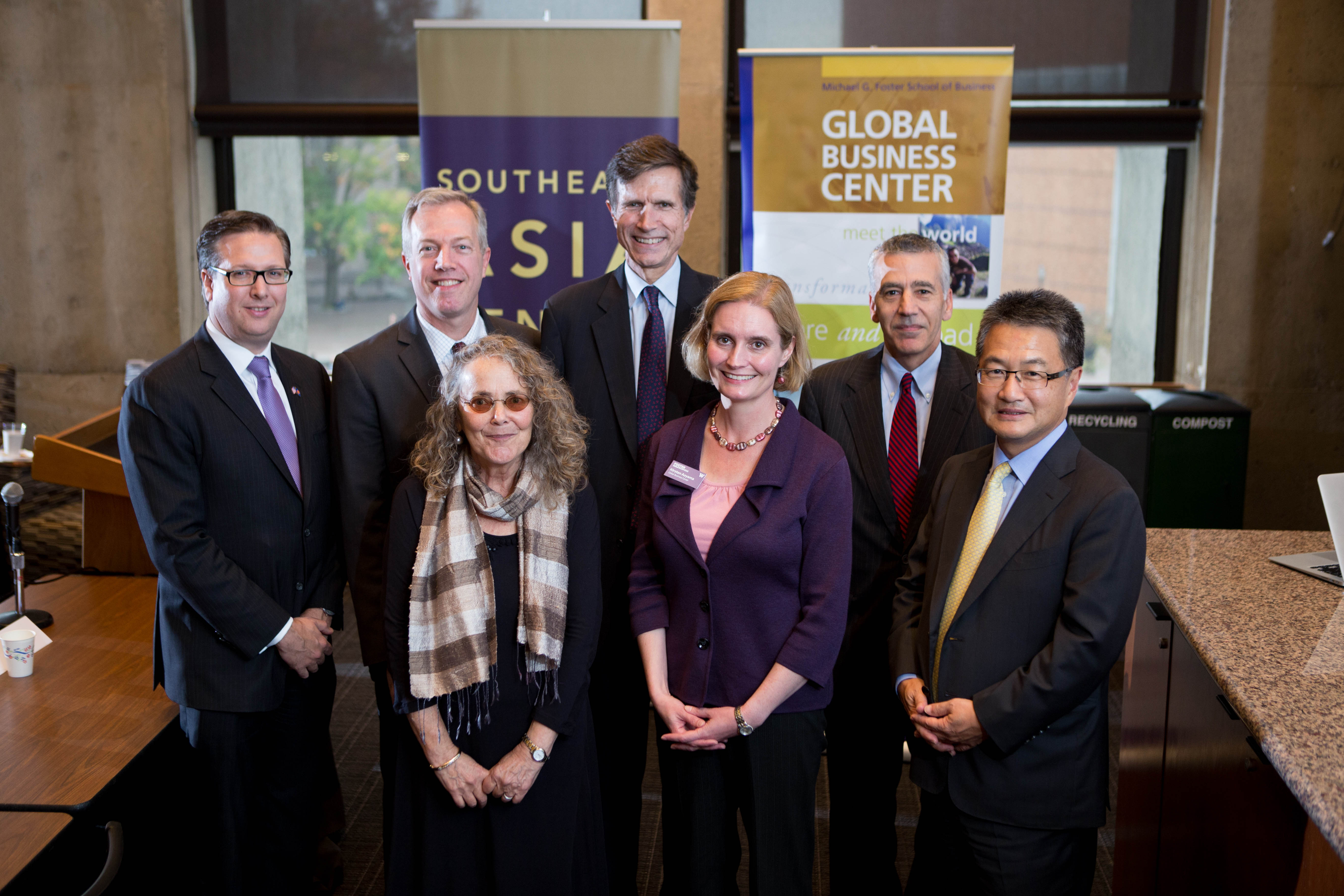
From left to right: ASEAN Business Council President Alex Feldman, Ambassador Ted Osius, Director of Southeast Asia Center Laurie Sears, Ambassador Robert O. Blake Jr., Director of the Global Business Center Kirsten Aoyama, Ambassador Philip S. Goldberg, and Ambassador Joseph Y. Yun
Fresh off the heels of Chinese President Xi Jinping’s visit to Washington state last month, Foster’s Global Business Center, the Southeast Asia Center in the Henry M. Jackson School of International Studies, and the University Of Washington Office Of Global Affairs hosted a panel discussion on Southeast Asia with US Ambassadors the Honorable Robert O. Blake, Jr. (Indonesia), the Honorable Philip S. Goldberg (the Philippines), the Honorable Ted Osius (Vietnam), and the Honorable Joseph Y. Yun (Malaysia). With the Obama Administration’s guiding principle of “restoring balance” cast as the foreign relations backdrop, each ambassador detailed his approach and philosophies to the three tiers of diplomacy: economics, military and security, and people-to-people relationships. Alex Feldman, the President and CEO of the U.S.-ASEAN (Association of Southeast Asian Nations) Business Council, moderated the discussion.
Economics
Growth and opportunity were a common theme when discussing the economic power of Southeast Asia. According to Ambassador Goldberg, the Filipino economy (once known as “the sick man of Asia”) “has a growth rate of 5-7 percent.” Goldberg also pointed to growing Filipino 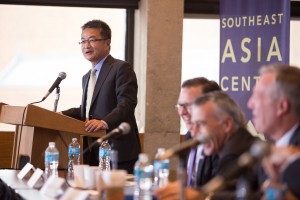 industries, stating, “The country rivals India in the number of call centers in operation.” Indonesia currently does $28 billion in trade with the U.S., which for Ambassador Blake, is “far less than it should be” considering its “near trillion dollar economy.” The ambassadors also argued in favor of the controversial Trans-Pacific Partnership (TPP)* trade agreement between the United States and several Pacific Rim countries (which includes Malaysia and Vietnam). While supportive of TPP, Ambassador Yun acknowledged the controversy, stating, “TPP has divided Malaysia just like the U.S.” However, he believes the agreement will have a positive impact on the world economy (including Washington’s), pointing to local agricultural exports like apples, wine, and cherries. He also recalled a recent conversation with a Seattle official who said “40 percent of jobs [in the city] depend on trade and investment in Asia.” Feldman noted that Washington State alone “sends six billion dollars of exports to ASEAN every year.”
industries, stating, “The country rivals India in the number of call centers in operation.” Indonesia currently does $28 billion in trade with the U.S., which for Ambassador Blake, is “far less than it should be” considering its “near trillion dollar economy.” The ambassadors also argued in favor of the controversial Trans-Pacific Partnership (TPP)* trade agreement between the United States and several Pacific Rim countries (which includes Malaysia and Vietnam). While supportive of TPP, Ambassador Yun acknowledged the controversy, stating, “TPP has divided Malaysia just like the U.S.” However, he believes the agreement will have a positive impact on the world economy (including Washington’s), pointing to local agricultural exports like apples, wine, and cherries. He also recalled a recent conversation with a Seattle official who said “40 percent of jobs [in the city] depend on trade and investment in Asia.” Feldman noted that Washington State alone “sends six billion dollars of exports to ASEAN every year.”
Strengthening ties in security and military
Despite a decades long war that resulted in American troop withdrawal, Ambassador Osius categorizes the current relationship between Vietnam and the U.S. as positive and “surging.” He credits this to “talking and acting on the past” with the U.S. helping to clean up the remnants of the chemical herbicide and defoliant Agent Orange, accounting for lives lost on both sides of the war, and encouraging burials for fallen south-Vietnamese soldiers. The conversation moved towards religious extremism with both Blake and Yun noting the importance of having Muslim-majority allies in the region. Described as “the largest Muslim-majority democracy in the world,” Blake underscored Indonesia’s vital role as religious moderates in a continent increasingly under threat from fundamentalists groups like ISIS. Yun agreed, stating that Malaysia is an “important global partner in counter-terrorism.”
People to People
From education initiatives to state visits, people-to-people diplomacy helps generate on-the-ground support for the U.S. Osius notes that the U.S. is very popular among the Vietnamese, stating “92 percent of Vietnamese consider us their best friend.” Though good for the United States, this popularity presents a challenge 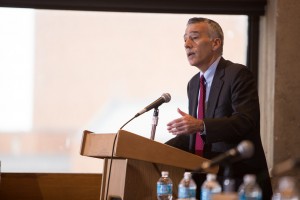 to the Communist Party who must be both “nationalistic and pro-American.” The U.S. has taken a very active role in helping Vietnam reduce HIV/AIDS cases, contributing $1 billion to the cause. The U.S. is also partnering with Vietnam to open three Fulbright University campuses in Ho Chi Minh City by 2018. The faculty, Osius revealed, will be made up of mostly American-educated Vietnamese. On the topic of education, Blake said that he would like to see more Indonesian students studying in the U.S. The ambassador also mentioned the importance of accessibility to the public, joking that his office is the only diplomatic office in a mall. According to Ambassador Goldberg, the U.S. has an “80 percent favorability” rating amongst Filipinos. One component that keeps Filipino-U.S. relations strong is the sheer number of Filipino-Americans. Surprising many of the event attendees, Golderg stated that Filipinos are “the second largest immigrant group in the U.S.,” a fact often lost in immigration debates.
to the Communist Party who must be both “nationalistic and pro-American.” The U.S. has taken a very active role in helping Vietnam reduce HIV/AIDS cases, contributing $1 billion to the cause. The U.S. is also partnering with Vietnam to open three Fulbright University campuses in Ho Chi Minh City by 2018. The faculty, Osius revealed, will be made up of mostly American-educated Vietnamese. On the topic of education, Blake said that he would like to see more Indonesian students studying in the U.S. The ambassador also mentioned the importance of accessibility to the public, joking that his office is the only diplomatic office in a mall. According to Ambassador Goldberg, the U.S. has an “80 percent favorability” rating amongst Filipinos. One component that keeps Filipino-U.S. relations strong is the sheer number of Filipino-Americans. Surprising many of the event attendees, Golderg stated that Filipinos are “the second largest immigrant group in the U.S.,” a fact often lost in immigration debates.
Speaking on behalf of the business sector, Feldman argued in favor of a fourth type of diplomacy: commerce. Related to people-to-people, commerce diplomacy brings corporate social responsibility programs to nations across the world. Through these programs, reasoned Feldman, “Americans are able to show that they care about the countries they operate in.”
The University of Washington was the last stop on the ambassadors’ and the ASEAN Business Council’s week-long tour. See more photos of their UW visit, including a special trip to the Connibear Shellhouse, below.

Fans of the book Boys in the Boat, Ambassadors Blake and Osius hold the Varsity Challenge Cup along with Men’s Coach Michael Callahan
*A final agreement on TPP was reached by the United States and 10 Pacific Rim nations two days after the ASEAN panel discussion. Congressional approval is pending.

